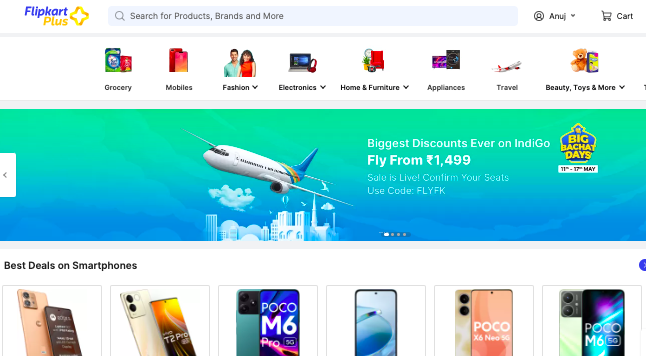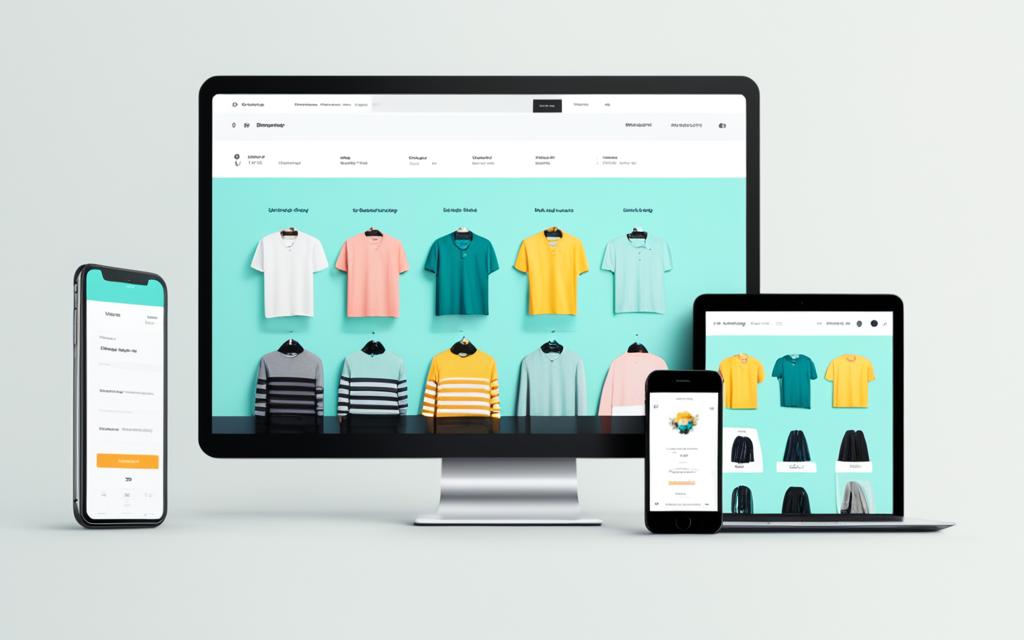As an entrepreneur, the decision to choose the right ecommerce platform can make or break your online business.
Enter Shopify and Flipkart, two titans of the ecommerce industry, each promising to revolutionize the way you sell your products to the world. But which one should you choose?
In this comprehensive guide, we’ll dive deep into the world of Shopify vs Flipkart, exploring the key features, pricing, design, marketing capabilities, and overall performance of these two powerhouses.
By the end of this article, you’ll have a clear understanding of the strengths and weaknesses of each platform, This will empower you to make an informed decision that aligns with your ecommerce goals.
Let’s start.
What is Shopify?
Shopify is a comprehensive ecommerce platform that empowers businesses of all sizes to create and manage their online stores.
The platform offers a wide range of features that cater to the unique needs of small to medium-sized enterprises, as well as larger corporations.
From building a visually appealing online store to managing inventory, processing orders, and integrating with various payment gateways, Shopify provides a robust and user-friendly solution for your ecommerce platform requirements.
Try Shopify free followed by first month at just $1. No credit card required. Limited Time Offer.
What is Flipkart?
Flipkart is a leading ecommerce marketplace based in India, founded in 2007.
As an online retail platform, Flipkart offers a wide range of products across various categories, including electronics, fashion, home decor, and more.
The Flipkart platform functions as a marketplace, allowing businesses and individual sellers to list and sell their products to a large customer base throughout India.
Sellers can easily list their products on the Flipkart platform, taking advantage of the site’s extensive customer base and robust logistics and fulfillment capabilities.
Check Out: Printify vs Shopify
Ease of Use
Shopify is renowned for its user-friendly interface and intuitive design, making it accessible for businesses of all sizes, from beginners to experienced ecommerce entrepreneurs.
The platform’s drag-and-drop website builder and pre-designed themes allow you to create a professional-looking online store with minimal technical knowledge.
On the other hand, Flipkart, as an ecommerce marketplace, may require a slightly steeper learning curve as you navigate the platform’s seller tools and processes to list and manage your products.
Store Setup
With Shopify, the process of setting up an online store is streamlined and straightforward. You can quickly create your store, customize the design, and start selling your products with just a few clicks.
Shopify’s extensive library of themes and templates, coupled with its user-friendly dashboard, makes it easy for you to get your online business up and running in a matter of hours.
In contrast, Flipkart’s seller onboarding process may involve additional steps, such as providing business documents and setting up your seller account, which can be more time-consuming for those new to the ecommerce landscape.
Managing Inventory & Orders
Both Shopify and Flipkart offer robust inventory management and order processing capabilities, but with some differences in their approach.
Shopify’s intuitive inventory management system allows you to easily track stock levels, receive notifications for low inventory, and manage product variations with ease.
The platform also streamlines the order fulfillment process, providing you with tools to process orders, print shipping labels, and handle customer communication.
Flipkart, as an ecommerce marketplace, focuses more on order management, with features to monitor your sales, track order status, and handle customer inquiries and returns.
While Flipkart may require a bit more manual effort in managing your inventory, the platform’s order management tools can be beneficial for businesses looking to expand their reach within the Indian market.
Also Read: Is Shopify Good For Dropshipping?
Design & Customization
The ability to create a visually appealing and customized Shopify website design or Flipkart website design is another important factor when comparing these two leading ecommerce platforms.
Both Shopify and Flipkart offer a wide range of ecommerce platform themes and templates to help businesses establish an online presence that reflects their brand identity.
Website Themes & Templates
Shopify’s theme store provides a diverse selection of professionally designed website themes that can be easily customized to suit your specific needs.
With hundreds of options to choose from, ranging from minimalist to feature-rich, you can find a Shopify website design that perfectly aligns with your brand’s aesthetic.
Similarly, Flipkart offers a variety of ecommerce platform themes, catering to different industry verticals and design preferences, making it easier for businesses to create a visually compelling online store.
Customization Options
Shopify offers extensive Shopify customization options, allowing you to modify various elements of your online store, from the layout and color scheme to the integration of third-party apps and extensions.
The level of Shopify customization enables you to create a truly unique and branded ecommerce experience.
Flipkart customization options empower businesses to personalize their online presence within the ecommerce platform’s framework, ensuring a cohesive and professional-looking ecommerce platform customization.
Also Read: Systeme.io vs Shopify
Try Shopify free followed by first month at just $1. No credit card required. Limited Time Offer.
Payment & Shipping
The ability to seamlessly integrate payment gateways and offer a smooth checkout experience is crucial for any ecommerce platform.
Payment Gateway Integration
Shopify offers a wide range of built-in payment gateways, including popular options like Stripe, PayPal, and Shopify Payments, making it easy for businesses to accept online payments.
Flipkart integrates with a variety of payment processors, such as PhonePe, Google Pay, and Razorpay, allowing sellers to offer their customers a seamless checkout experience.
Shipping & Fulfillment Options
Shopify’s platform integrates with leading shipping carriers, including USPS, FedEx, and DHL, enabling merchants to calculate real-time shipping rates, print labels, and streamline the order fulfillment process.
Flipkart, on the other side, provides its own logistics network, Ekart, which offers flexible shipping and delivery options for sellers, ensuring timely and reliable order fulfillment.
Marketing & SEO
From email campaigns and social media integrations to discount codes and loyalty programs, these ecommerce platforms provide a comprehensive suite of features to support your marketing efforts.
Built-in Marketing Tools
Shopify’s marketing toolkit includes email marketing automation, gift cards, discount codes, and integrations with popular social media platforms like Facebook, Instagram, and Pinterest.
These tools make it easier to engage with your target audience, run targeted promotions, and build brand loyalty.
Flipkart also offers a selection of marketing features, such as sponsored product listings, targeted email campaigns, and the ability to create custom coupon codes for your customers.
SEO Capabilities
Search engine optimization (SEO) is crucial for driving organic traffic and visibility to your online store, and both Shopify and Flipkart offer features to support this.
Shopify’s built-in SEO tools include customizable page titles, meta descriptions, and URL slugs, as well as the ability to generate sitemaps and optimize images for search engines.
Flipkart also provides SEO-friendly product pages, category pages, and tools to help merchants optimize their listings for better discoverability on the platform.
Customer Support
When it comes to Shopify customer support and Flipkart customer support, both ecommerce platforms offer various resources and channels to assist merchants.
Shopify is known for its comprehensive customer support, with a team of knowledgeable representatives available 24/7 to address any questions or issues you may encounter.
From email and live chat to phone support, Shopify provides multiple avenues for you to reach out and receive timely assistance.
Additionally, the Shopify Help Center is a rich repository of articles, tutorials, and guides that cover a wide range of topics, empowering you to troubleshoot and resolve common problems on your own.
Flipkart also places a strong emphasis on merchant assistance, offering a dedicated seller support team to address your concerns.
Flipkart understands the importance of providing reliable customer support to its sellers, ensuring they can effectively manage their Flipkart store and deliver a seamless experience to their customers.
Try Shopify free followed by first month at just $1. No credit card required. Limited Time Offer.
Scalability & Growth
As your business grows, the ability of your ecommerce platform to handle increased traffic, sales, and complexity becomes a crucial consideration.
Both Shopify and Flipkart offer scalable solutions to support the expansion of your online operations.
Handling Increased Traffic & Sales
Shopify’s robust architecture and infrastructure are designed to accommodate significant spikes in traffic and sales volumes.
With the Shopify Plus plan, enterprises can leverage advanced features and dedicated support to manage high-traffic periods, such as seasonal sales or product launches, without experiencing performance issues or downtime.
Shopify’s scalability allows businesses to seamlessly expand their ecommerce presence as their customer base and order volumes grow.
Flipkart has a proven track record of handling large-scale traffic and sales. The platform’s enterprise-level infrastructure and advanced logistics capabilities enable Flipkart to support businesses of all sizes, from small-to-medium enterprises to large corporations.
Enterprise-Level Solutions
For businesses with complex requirements and a need for advanced features, both Shopify and Flipkart offer tailored enterprise-level solutions.
Shopify Plus, the platform’s enterprise-grade offering, provides additional customization options, dedicated support, and advanced reporting and analytics to cater to the needs of large-scale businesses.
Flipkart, on the other hand, offers its Flipkart Enterprise Solutions, which include dedicated account management, advanced seller tools, and seamless integration with existing enterprise systems.
Pricing & Fees
When comparing Shopify and Flipkart, it’s important to consider the pricing and fee structures of each platform. Both offer flexible options to accommodate businesses of various sizes and budgets.
Shopify’s Pricing Structure
Shopify offers a range of subscription plans to cater to your ecommerce needs. Their pricing structure includes the following options:
- Basic – $29/mo
- Shopify – $79/mo
- Advanced – $299/mo
- Plus – $2300/mo
These are yearly payment plans that saves you nearly 25%. Monthly payment plans are also available but at a slightly higher price.
In addition to the monthly subscription fees, Shopify also charges transaction fees on third-party payments, which range from 0.6% to 2% depending on your chosen plan.
Flipkart’s Seller Fees
Flipkart generates revenue through commissions and seller fees. The specific fees charged by Flipkart can vary depending on the product category, selling price, and other factors.
Some of the key fees for Flipkart sellers include:
- Marketplace Commission: Flipkart charges a commission on each sale, ranging from 5% to 30% depending on the product category.
- Seller Registration Fee: Sellers are required to pay a one-time registration fee to list their products on the Flipkart platform.
- Shipping and Logistics Fees: Flipkart offers various shipping and logistics services, and sellers are charged for these services based on the weight, size, and destination of the product.
- Payment Gateway Fees: Flipkart charges a percentage-based fee for each transaction processed through its payment gateway.
Check Out: Ecwid vs BigCommerce
Try Shopify free followed by first month at just $1. No credit card required. Limited Time Offer.
Integration & Add-Ons
Both Shopify and Flipkart offer the ability to integrate with a wide range of third-party tools and services to enhance the functionality of their respective ecommerce platforms.
These integrations and add-ons can help businesses streamline their operations, improve customer experience, and expand their sales and marketing capabilities.
Third-Party App Stores
Shopify’s robust app ecosystem, known as the Shopify App Store, provides merchants with access to over 6,000 third-party applications that can be easily integrated with their online stores.
These Shopify apps cover a diverse range of functionalities, from accounting and inventory management to marketing and CRM.
The extensive selection of Shopify apps allows businesses to tailor their ecommerce solution to their specific needs, seamlessly integrating essential tools and services.
Similarly, Flipkart offers its sellers a range of third-party tools and services, known as Flipkart seller tools, to enhance their operations and sales performance.
These Flipkart seller tools include features such as inventory management, order fulfillment, and promotional tools, enabling merchants to streamline their ecommerce activities and reach a wider customer base on the Flipkart marketplace.
Conclusion
Shopify’s user-friendly interface, robust features, and scalability make it an excellent choice for businesses of all sizes, while Flipkart’s extensive reach and Indian market dominance make it a compelling option for enterprises targeting the subcontinent.
Ultimately, the decision to choose between Shopify vs Flipkart will depend on your specific business needs, target audience, and growth aspirations.
If you’re seeking a comprehensive and customizable platform with global capabilities, Shopify may be the better fit.
Conversely, if your primary focus is on tapping into the Indian market, Flipkart’s extensive network and seller tools could be the more strategic choice.

















